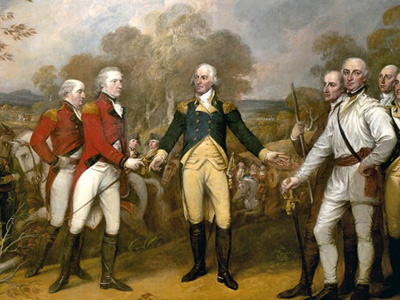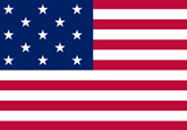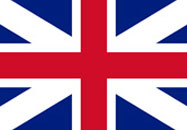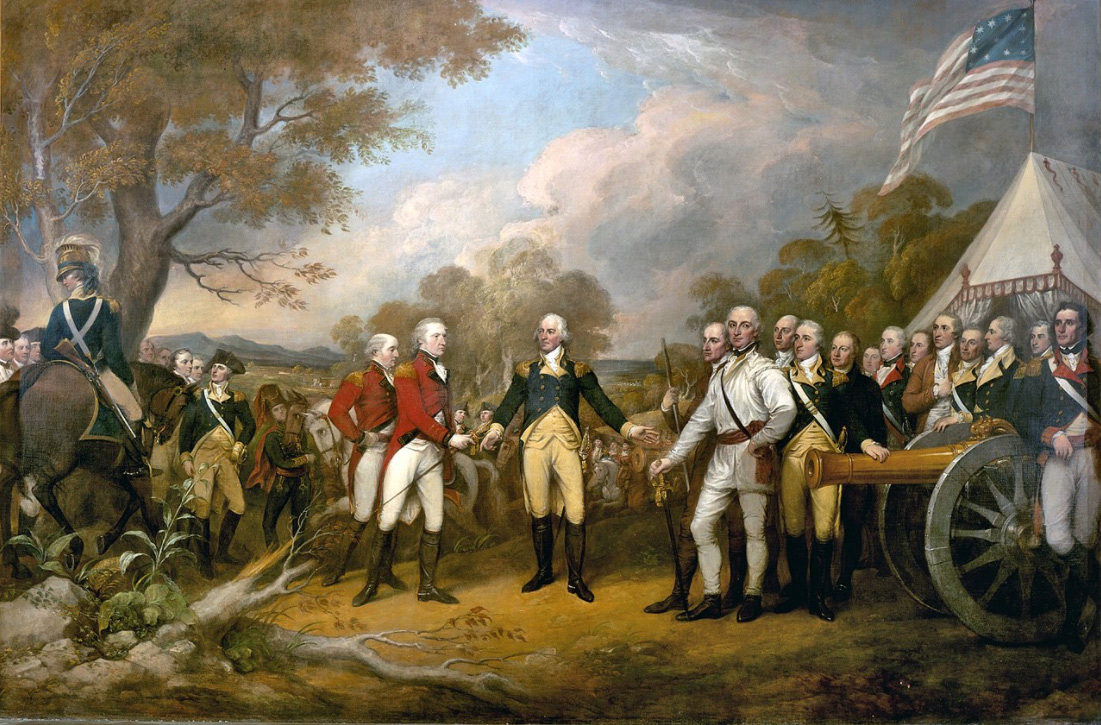Battles of Saratoga (1777)
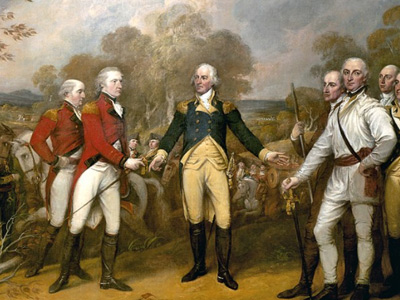
Second Saratoga: Battle of Bemis Heights
(October 7)
British Foray
While Burgoyne's troop strength was nominally higher, he likely had only about 5,000 effective, battle-ready troops on October 7, as losses from the earlier battles in the campaign and desertions following the September 19 battle had reduced his forces. General Riedesel advised that the army retreat. Burgoyne decided to reconnoiter the American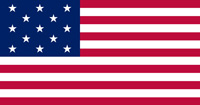 The United States of America (USA), is a country in North America. The American Revolutionary War (April 19, 1775 - September 3, 1783) was the military conflict in which American patriot forces under George Washington's command defeated the British, establishing and securing the independence of the United States. After the Revolution, the United States gained independence, the first nation-state founded on Enlightenment principles of liberal democracy. left flank to see if an attack was possible. As an escort, the generals took Fraser's Advanced Corps, with light troops and the 24th Foot on the right and the combined British grenadiers on the left, and a force drawn from all the German regiments in the army in the center. There were eight British cannon under Major Williams and two Hesse-Hanau cannon under Captain Pausch. Leaving their camp between 10 and 11 am, they advanced about three-quarters of a mile (1 km) to Barber's wheat field on a rise above Mill Brook, where they stopped to observe the American position. While the field afforded some room for artillery to work, the flanks were dangerously close to the surrounding woods.
The United States of America (USA), is a country in North America. The American Revolutionary War (April 19, 1775 - September 3, 1783) was the military conflict in which American patriot forces under George Washington's command defeated the British, establishing and securing the independence of the United States. After the Revolution, the United States gained independence, the first nation-state founded on Enlightenment principles of liberal democracy. left flank to see if an attack was possible. As an escort, the generals took Fraser's Advanced Corps, with light troops and the 24th Foot on the right and the combined British grenadiers on the left, and a force drawn from all the German regiments in the army in the center. There were eight British cannon under Major Williams and two Hesse-Hanau cannon under Captain Pausch. Leaving their camp between 10 and 11 am, they advanced about three-quarters of a mile (1 km) to Barber's wheat field on a rise above Mill Brook, where they stopped to observe the American position. While the field afforded some room for artillery to work, the flanks were dangerously close to the surrounding woods.
Gates, following the removal of Arnold from the field command, assumed command of the American left and gave the right to General Lincoln. When American scouts brought news of Burgoyne's movement to Gates, he ordered Morgan's riflemen out to the far left, with Poor's men (1st, 2nd, and 3rd New Hampshire on the left; the 2nd and 4th New York Regiments) on the right, and Learned's (1st New York, 1st Canadian, 2nd, 8th and 9th Massachusetts Regiments, plus militia companies) in the center. A force of 1,200 New York militia under Brigadier General Abraham Ten Broeck was held in reserve behind Learned's line. In all, more than 8,000 Americans took the field that day, including about 1,400 men from Lincoln's command that were deployed when the action became particularly fierce.
The opening fire came between 2 and 2:30 pm from the British grenadiers. Poor's men held their fire, and the terrain made the British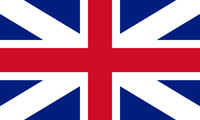 The Kingdom of Great Britain was a sovereign country in Western Europe from 1 May 1707 to the end of 31 December 1800. The state was created by the 1706 Treaty of Union and ratified by the Acts of Union 1707, which united the kingdoms of England (which included Wales) and Scotland to form a single kingdom encompassing the whole island of Great Britain and its outlying islands, with the exception of the Isle of Man and the Channel Islands. shooting largely ineffective. When Major Acland led the British grenadiers in a bayonet charge, the Americans finally began shooting at close range. Acland fell, shot in both legs, and many of the grenadiers also went down. Their column was a total rout, and Poor's men advanced to take Acland and Williams prisoner and capture their artillery. On the American left, things were also not going well for the British. Morgan's men swept aside the Canadians and Native Americans to engage Fraser's regulars. Although slightly outnumbered, Morgan managed to break up several British attempts to move west. While General Fraser was mortally wounded in this phase of the battle, a frequently told story claiming it to be the work of Timothy Murphy, one of Morgan's men, appears to be a 19th-century fabrication. The fall of Fraser and the arrival of Ten Broeck's large militia brigade (which roughly equaled the entire British reconnaissance force in size), broke the British will, and they began a disorganized retreat toward their entrenchments. Burgoyne was also very nearly killed by one of Morgan's marksmen; three shots hit his horse, hat, and waistcoat.
The Kingdom of Great Britain was a sovereign country in Western Europe from 1 May 1707 to the end of 31 December 1800. The state was created by the 1706 Treaty of Union and ratified by the Acts of Union 1707, which united the kingdoms of England (which included Wales) and Scotland to form a single kingdom encompassing the whole island of Great Britain and its outlying islands, with the exception of the Isle of Man and the Channel Islands. shooting largely ineffective. When Major Acland led the British grenadiers in a bayonet charge, the Americans finally began shooting at close range. Acland fell, shot in both legs, and many of the grenadiers also went down. Their column was a total rout, and Poor's men advanced to take Acland and Williams prisoner and capture their artillery. On the American left, things were also not going well for the British. Morgan's men swept aside the Canadians and Native Americans to engage Fraser's regulars. Although slightly outnumbered, Morgan managed to break up several British attempts to move west. While General Fraser was mortally wounded in this phase of the battle, a frequently told story claiming it to be the work of Timothy Murphy, one of Morgan's men, appears to be a 19th-century fabrication. The fall of Fraser and the arrival of Ten Broeck's large militia brigade (which roughly equaled the entire British reconnaissance force in size), broke the British will, and they began a disorganized retreat toward their entrenchments. Burgoyne was also very nearly killed by one of Morgan's marksmen; three shots hit his horse, hat, and waistcoat.
The first phase of the battle lasted about one hour and cost Burgoyne nearly 400 men, including the capture of most of the grenadiers' command, and six of the ten field pieces brought to the action.
American Attack
At this point, the Americans were joined by an unexpected participant. General Arnold, who was "betraying great agitation and wrath" in the American camp, and may have been drinking, rode out to join the action. Gates immediately sent Major Armstrong after him with orders to return; Armstrong did not catch up with Arnold until the action was effectively over. (A letter, written by a witness to proceedings in the camp, suggests that Arnold did in fact have authorization from Gates to engage in this action.)
The defenses on the right side of the British camp were anchored by two redoubts. The outermost one was defended by about 300 men under the command of the Hessian Heinrich von Breymann, while the other was under the command of Lord Balcarres. A small contingent of Canadians occupied the ground between these two fortifications. Most of the retreating force headed for Balcarres' position, as Breymann's was slightly north and further away from the early action.
Arnold led the American chase, and then led Poor's men in an attack on the Balcarres redoubt. Balcarres had set up his defenses well, and the redoubt was held, in action so fierce that Burgoyne afterwards wrote, "A more determined perseverance than they showed … is not in any officer's experience". Seeing that the advance was checked, and that Learned was preparing to attack the Breymann redoubt, Arnold moved toward that action, recklessly riding between the lines and remarkably emerging unhurt. He led the charge of Learned's men through the gap between the redoubts, which exposed the rear of Breymann's position, where Morgan's men had circled around from the far side. In furious battle, the redoubt was taken and Breymann was killed. Arnold's horse was hit in one of the final volleys, and Arnold's leg was broken by both shot and the falling horse. Major Armstrong finally caught up with Arnold to officially order him back to headquarters; he was carried back in a litter.
The capture of Breymann's redoubt exposed the British camp, but darkness was setting in. An attempt by some Germans to retake the redoubt ended in capture as darkness fell and an unreliable guide led them to the American line.
HISTORY
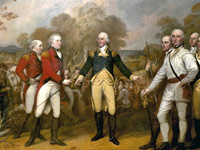
RESOURCES
This article uses material from the Wikipedia article "Battles of Saratoga (1777)", which is released under the Creative Commons Attribution-Share-Alike License 3.0.
© Stories Preschool. All Rights Reserved.
